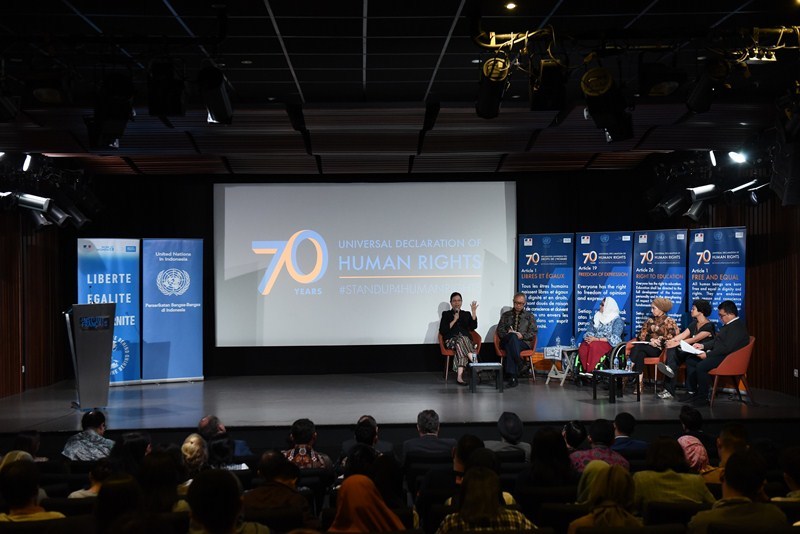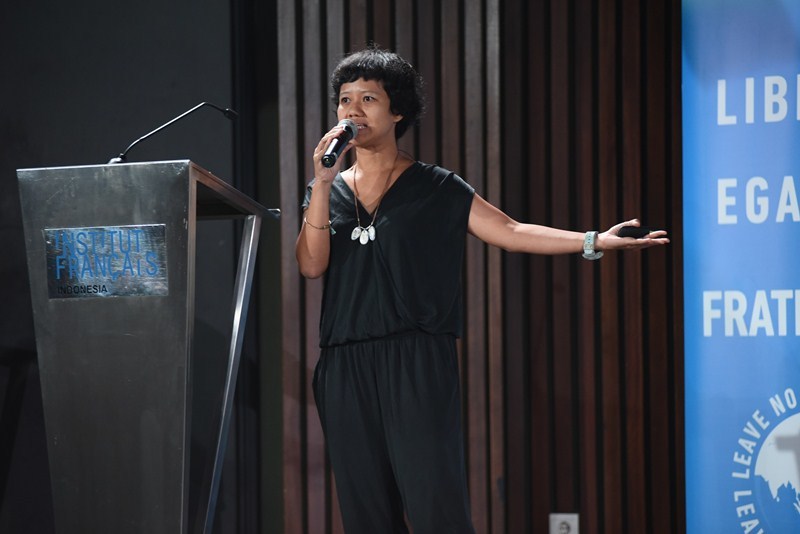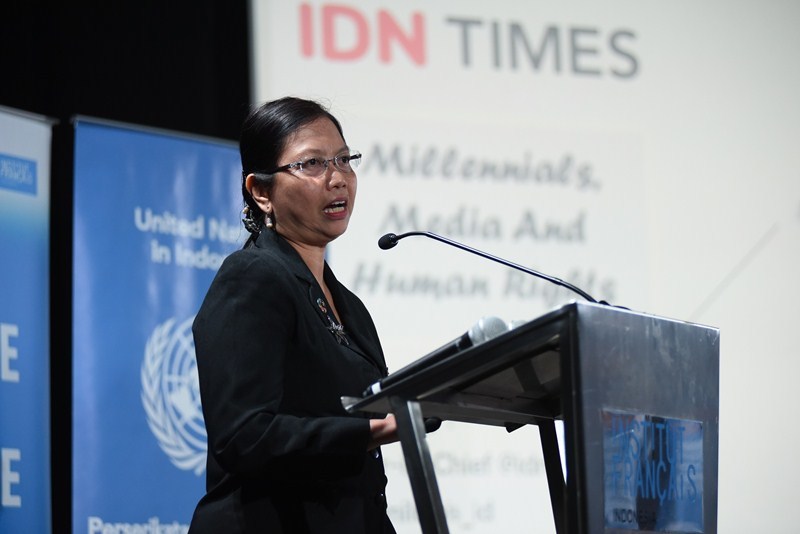70 years after the signing of the Universal Declaration of Human Rights, and the more recently instituted Sustainable Development Goals (SDG), where does Indonesia stand? Is the country closer to achieving these goals by 2030? The Embassy of France in collaboration with the French Institute in Indonesia (IFI) and the United Nations Indonesia held a discussion on these issues at IFI on 10 December. Speakers from NGOs, the media, and business shared their thoughts on the issue.

The Deputy Head of the European Union Delegation to Indonesia Charles-Michel Geurts welcomed the gathering and spoke about the EU-Indonesia partnership in working towards achieving the SDGs. During his address, he called for Indonesia to encourage more female engagement across all fields of employment, both in the private and public sectors. He also called for greater access to personalities with disabilities, a point echoed by the Representative of the Indonesian Association of Women with Disabilities Dwi Aryani.
Narrating her experience being denied employed due to her physical disability she called for the need for the industry and government to break barriers, especially given that one in seven individuals worldwide is disabled. Among the keys to achieving these goals, Dwi said, was to ensure strong policy including establishing legal frameworks to guarantee the rights of people with disabilities.
Another directive is to ensure resources are available for those who need it most, including spreading awareness of the rights of people with disabilities. Perhaps the most important call is the one for empowerment—for full and effective participation of people with disabilities in the development process, such as in providing facilities for individuals such as access to buildings and public facilities.
Among the five central themes focusing on the objective of sustainable development was access to education. Ananto Kusuma Seta, Staff for Innovation and Competitiveness of the Ministry of Education and Culture who talked about the fundamental right to education and called for the government to make education available for all citizens.
"The biggest challenge is aligning our education system with the changes in the world,” he said. “Both teachers and students need to be technologically literate,” Ananto added, noting that the importance of education is not just a transfer of knowledge but is also important for building creativity, forming leadership, adaptability and problem solving skills.
Shinta Dhanuwardoyo,Founder and CEO of Bubu.com was also among the panelists. A digital trailblazer, she spoke about the breaking the glass ceiling and pushing against the barrier, to “think beyond the walls” around society. Indeed, her pioneering efforts at multiple ‘dot com’s’ during the internet revolution and more recently as an angel investor in multiple startups, she has a wealth of experience under her belt and encouraged more women to take opportunities in the STEM (Science, Technology, Engineering and Mathematics) stream.

Founder of Papermoon Puppet Theater Maria Tri Sulistyani spoke about the rights to art, culture and science. Her organisation, Papermoon Puppet Theater, which she helped found 12 years ago, has been involved in creating expressions of history through various puppetry productions. More recently it held a workshop for hearing-impaired children. "Art should be accessible to everyone without exception. Art is very important in human life. With our art is not only a human being capable of thinking but also capable of feeling and reflection,"said the woman who has performed worldwide including Kuala Lumpur, Philadelphia, New York, Washington DC, New Delhi, Thailand, Philippines, Japan and several cities in the UK.
Regarding the role of the media in achieving the SDGs, Editor in Chief of IDN Times Uni Lubis spoke about the heightened importance of the press especially in the age of growing animosity and aversion to the field thanks to the rise of populist ideology.
Reminding the audience that the role of the press is "voicing the voiceless", it is in line with human rights enforcement efforts- a forum for those who have no voice, to help provide reliable directives and also serves as the motor of the human rights struggle. She shared a chart detailing the seven pillars of IDN Times which include: gender equality, anti-sexual harassment, anti-bullying, unity in race and ethnicity, unity in religion, redefining beauty and anti-stereotyping.
Addressing the importance of independent media, the organisation works on encouraging those in the current, millennial generation, to take up the baton and to fight for social justice across all fields.

The panel agreed on the need to move away from unilateralism, the need to elect more caring leaders who can instill values of tolerance for diversity at an early age,include it in school curricula and encourage greater gender equality. During concluding remarks of the event moderated by Angga Dwi Martha from UNICEF Indonesia, Shinta called for addressing the need for more gender equality in the work place and encouraged participants to take a stand against discrimination based on gender, a point seconded by Dwi who called for more inclusion in public planning. Maria reminded the audience about Indonesia’s rich diversity, of the country’s art and culture being the DNA of the nation, and encouraged the use of art as politics, to educate the masses.
With Millennials being the future, they held the keys to success and had the most potential to advocate for social justice, Uni said. Highlighting the importance of education as a tool for greater awareness, the panel collectively intoned the audience to go forward—in a more inclusive manner— with the country’s quest for the achievement of the SDGs.
“Your finger has big power. Do good with it,” Maria said, to resounding applause.







